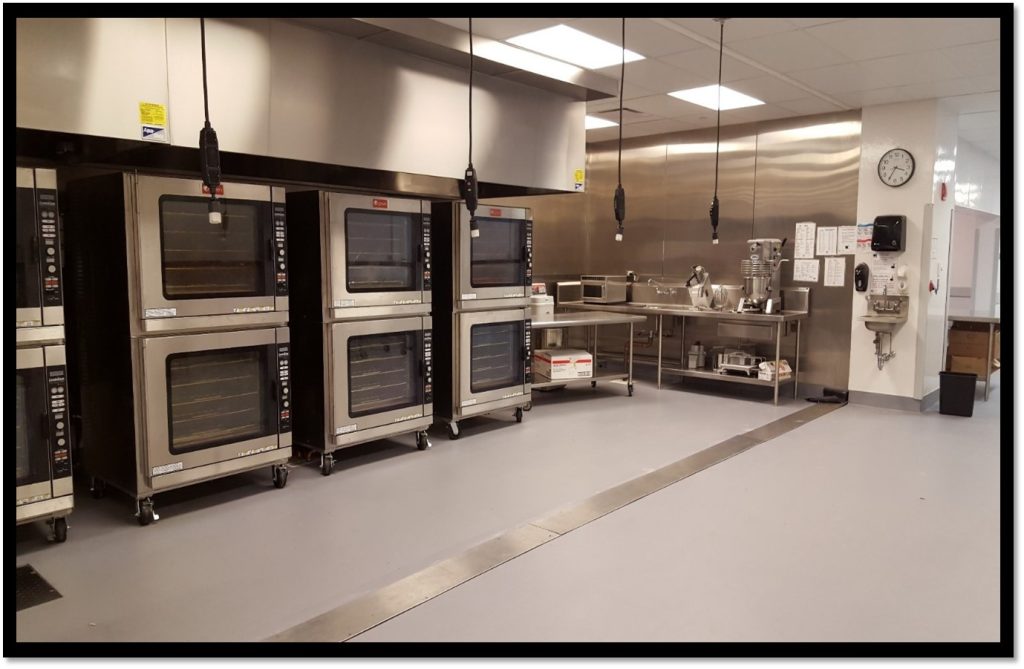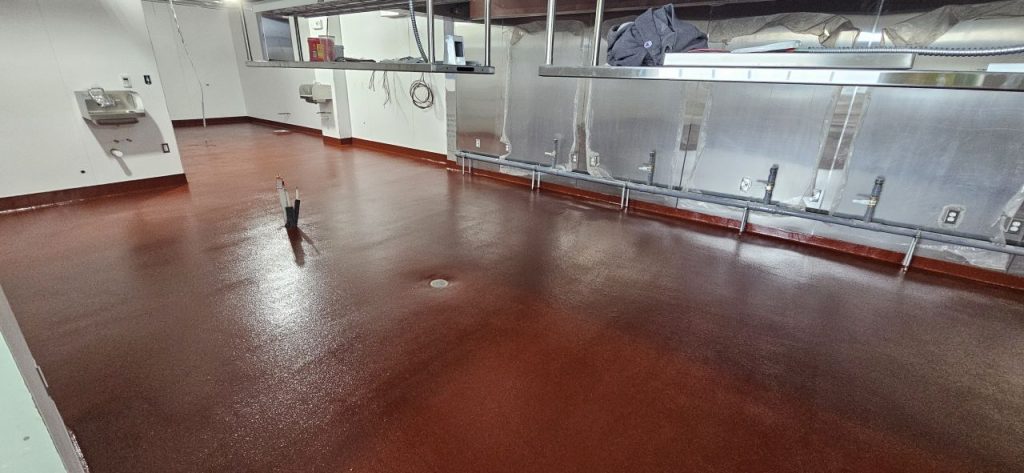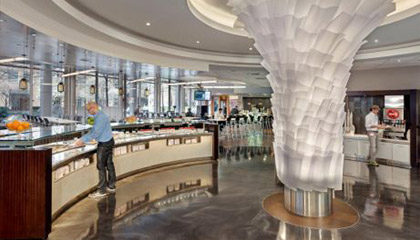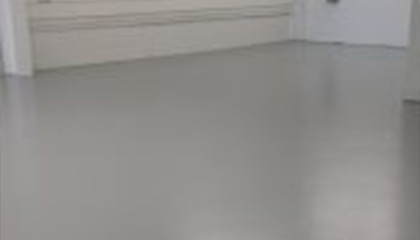Whether it’s industrial back of house restaurant operations, or private catering, cafes, cafeterias, and even retail food production areas, selecting the right commercial kitchen floors is a critical component of a commercial kitchen’s design that impacts operational efficiency, hygiene, and employee safety.
Choosing the right flooring material
Outfitting a commercial kitchen with the right flooring, requires reverse engineering to withstand the specific stressors of a space. This includes high-traffic areas subject to food byproducts, chemical sanitization, and moisture and vapor mitigation to name a few. The installation process is crucial in ensuring the durability and safety of commercial kitchen flooring.
While there are a number of commercial kitchen flooring options facility and business managers can choose from, resinous coatings typically stand out for their durability, longevity, safety and ROI. Let’s take a look at some of the options available to businesses looking for high-impact flooring for commercial kitchens.
Concrete
Concrete flooring alone won’t cut it. However, when coupled with the right epoxy or polyaspartic coatings, it boasts unmatched durability and an ease of maintenance that are non-negotiables in such punishing environments. Customization is a big plus with an array of colors and branding options, ensuring safety doesn’t take a back seat to style.
Vinyl and Tile
Vinyl flooring and tile flooring are often found in older commercial kitchens, as they were once the only players in high performance flooring that was versatile and cost effective enough to tie a space together. However, as seamless floors entered the arena, it was clear that repair and necessary maintenance of vinyl and tile flooring was more cost prohibitive. While they can both hold up against heavy foot traffic, the grout in tile floors does not protect as well against contamination as resinous coatings, and vinyl is more easily damaged and in need of costly repairs.
Resinous Flooring

A gold standard of commercial kitchen flooring, epoxy flooring is a durable and sanitary solution with superb bonding strength to concrete or wood substrates, making it an ideal choice. Its thermal shock and chemical resistance, along with non-slip additives and seamless protection, ensure kitchen operations run smoothly. Resinous floors are at the intersection of practicality and style, offering ease of maintenance and daily chemical cleanings, colors and stencil options for customization, and the durability to withstand different temperatures found in commercial kitchens in areas such as walk-in freezers.
Seamless Floors for Commercial Kitchens
Seamless flooring solutions have emerged as the go-to floor system that surpasses compliance requirements including FDA, OSHA, and cGMP standards. Slip resistant flooring is crucial in maintaining safety in high-traffic areas of commercial kitchens. Black Bear engineers pro-grade seamless floors for restaurants, campus and corporate cafeterias, retail supermarket chains, manufacturing facilities and small businesses. Take a look at some of the concrete coatings available for commercial kitchens.
Epoxy Flooring
Not all epoxy coatings are created equally. While their superior slip and chemical resistance make them ideal for handling the rigorous demands of high-traffic culinary settings, opting for coatings with an abrasion rating of 8mgs or lower ensures a tougher, longer-lasting surface. The top-grade systems boast a SHORE-D rating, standing resilient against thermal shocks like hot oil spills without sacrificing ease of cleaning or appearance. With the potential to endure for up to a decade, epoxy-coated floors are a hygienic, durable solution for commercial kitchens, further enhanced when paired with rubber mats for staff comfort.
Benefits of Epoxy at a glance:
- Abrasion Rating: ≤ 8mgs for durability
- SHORE-D Rating: Top of the hardness chart for extreme durability
- Temperature Resistance: Withstands hot oil spills up to 350 degrees
- Chemical Cross-Linked Finish: Offers heavy-duty impact resistance
- Lifespan: Reliable flooring that lasts 8-10 years
Urethane Flooring
Another widely preferred coating is urethane cement – touted for its toughness and longevity. Slip resistance is crucial in ensuring employee safety in commercial kitchens. With an exceptional ability to resist thermal shock, chemicals, and inhibit bacterial growth, these coatings are a fortress on a commercial kitchen floor. Their versatility and compatibility with various substrates and low-odor installation, allows for commercial kitchen renovations and repair with little to no downtime in operations. Urethane coatings require minimal maintenance and can be enhanced with anti-slip properties, making it a compliant and enduring choice for environments where food prep and safety is a priority.
Benefits of Urethane at a glance:
- Ideal for the heavy demands of commercial kitchens
- Inhibits bacterial and fungal growth
- Resistant to thermal shocks and chemicals
- Adheres strongly to various substrates
- Quick and easy to install, with low odor
- Low maintenance for a lasting solution
- Anti-slip options to ensure employee safety
MMA Flooring
Methyl methacrylate (MMA) flooring systems introduce a unique blend of chemical resistance and speedy installation, perfect for commercial settings that can’t afford extended downtime. While natural stone offers aesthetic appeal and durability, MMA flooring provides a more practical solution for busy environments. MMA is synonymous with durability and is engineered to withstand harsh kitchen environments. The completely seamless surface is an effective barrier against electrostatic discharge – an essential quality in industry-specific applications. With its high performance in commercial and industrial settings, MMA flooring offers a blend of practicality and enduring resilience.
Benefits of MMA at a glance:
- Chemical Resistance
- Rapid Installation
- Low-Temperature Suitability
- Seamless and Easy to Clean
- ESD Protection
Polyaspartic Flooring
Polyaspartic coatings are designed to endure abrasive environmental stressors. Qualified flooring installers are essential for the proper installation of polyaspartic flooring to ensure its longevity and effectiveness. It also withstands extremes temperature changes and holds up well against chemical exposures. Nonslip additives and antimicrobial properties make it a safe workspace option that exceeds commercial kitchen compliance standards. Renowned for durability, polyaspartic flooring solutions are at the forefront of prograde commercial kitchen flooring.
Benefits of Polyaspartic at a glance
- Durability Against Extremes
- Chemical and Impact Resistance
- Non-Slip Safety Advantage
- Hygienic & Antimicrobial
Maintaining Commercial Kitchen Flooring

Ensuring the integrity of a commercial kitchen floor system is necessary to achieve optimal ROI. Maintenance guidelines are crucial in ensuring the longevity and effectiveness of commercial kitchen flooring. It’s even more important when you consider the consequences of harmful bacteria at bay and hazards lurking in a commercial food prep environment that could be a detriment to your business.
Installing a seamless floor cuts down on your maintenance significantly. It’s easy to keep clean, can withstand high heat and intense chemical sanitization processes, and the right floor contractor will provide basic instructions to maintaining your floor system.
Understanding Maintenance Costs Versus Longevity and Durability
Proper cleaning and sealing are essential to uphold the hygiene and safety standards necessary for any food industry environment. Opting for non-porous surfaces like epoxy and concrete coated flooring can greatly simplify maintenance routines.
When it comes to commercial kitchen floors, understanding the balance between initial maintenance costs and the longevity and durability of the flooring material is crucial. Epoxy floors stand out as a cost-effective solution, offering minimal maintenance that typically requires just a simple wet mop to keep it pristine. In contrast, the high maintenance demands of ceramic tile flooring, with its susceptibility to wear, can lead to substantial yearly expenses for tile replacements and grout work.
Black Bear is New England’s Leading Commercial Kitchen Flooring Contractor
Choosing the right flooring for your commercial kitchen is a decision that will affect your operation’s safety, efficiency, and cleanliness. Black Bear is the number one partner in New England installing and repairing commercial kitchen flooring. Our flooring solutions are slip resistant, incorporating special textures and additives to maintain safe surfaces even under greasy and wet conditions.
Black Bear value engineers commercial kitchen flooring to manage the individual needs of each space assessing everything from foot traffic to chemical spills, thermal shock to contaminants. Our floors are not just impact resistant; they’re also designed to ensure employee safety and to help your business thrive.
Recognizing that each kitchen has unique needs, Black Bear provides the personalized services that result in longer lasting flooring. Contact us today for a no-obligation consultation and estimate


Our Customers Love Us
“The feeling of confidence that we had the best and the brightest flooring team. And that feeling was supported by their work.”
– Moon Hill Brewing Co.
Specialized Solutions for:
Industry Compliant
Installed with Little Downtime
High Performance
Sanitary and Easy to Maintain
Skid, Slip & Chemical Resistant